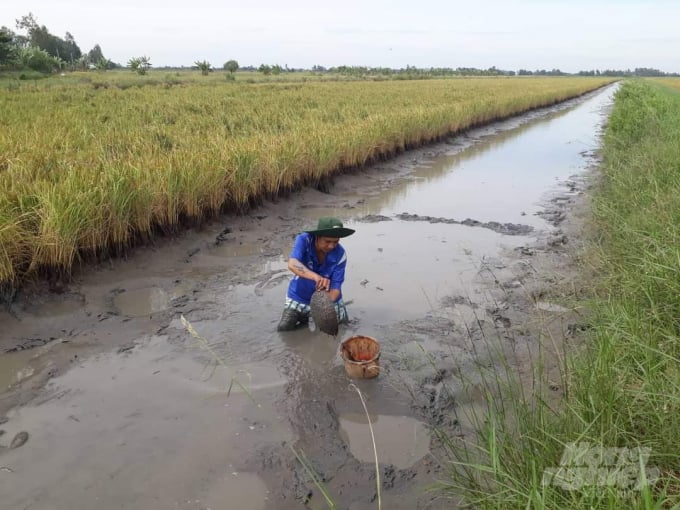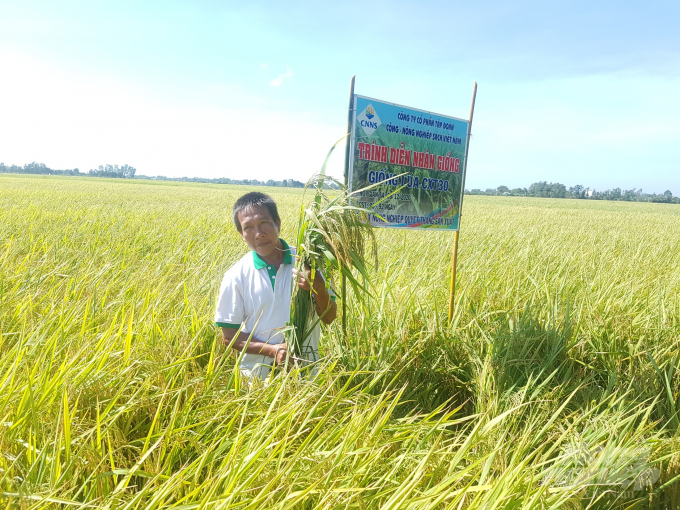May 21, 2025 | 23:21 GMT +7
May 21, 2025 | 23:21 GMT +7
Hotline: 0913.378.918
May 21, 2025 | 23:21 GMT +7
Hotline: 0913.378.918

The shrimp-rice model continues to be replicated, bringing both sustainable economic value and adaptation to climate change conditions. Photo: Trong Linh.
Over the past three years, the implementation of the State's Resolution 120 on “Sustainable development of Mekong Delta region adapting to climate change” opened up a new chapter, new thought, and new pathway to promote the durable growth of the key agriculture industry of the country.
Mekong Delta is dubbed as the largest agriculture hub of the country, contributing 50% of the rice output, 65% of aquaculture production, 70% fruits of the whole country while accounting for 95% of rice export, and 60% of fish export.
With rapid and deep integration into the world market, the production of standard and competitive goods with added value has become a matter of survival for each country. In particular, for localities whose economy is mainly based on agricultural production including Bac Lieu, raising the value of agricultural products is more necessary than ever.

The selected rice varieties grown on shrimp farming land must ensure salt tolerance characteristics. Photo: Trong Linh.
Deputy Director Pham Thanh Hai of the Department of Agriculture and Rural Development of Bac Lieu said that Bac Lieu province always prioritizes the development of the organic agriculture model in line with sustainability. Of which, the shrimp-rice model brings effectiveness and helps the farmer gain durable economic value.
On one hand, the farmers can remain in the area for rice farming and take advantage of saltwater during the salinity period for shrimp farming on the other hand to ensure economic growth according to the climate. Especially, it is suitable to the scheme proposed by the governement on organic argiculture development.
With the particular ecological condition, Bac Lieu comprises a series of potential and strengths to develop in both aspects of shrimp and rice, the two main force products to bring high turnover export.
Located the northern production area of National Highway 1A, including Hong Dan, Phuoc Long, and TX districts. Gia Rai has a total area of over 70,000 hectares applying the shrimp-rice model, accounting for over 51% of the province's aquaculture area. In recent years, although shrimp-rice production is considered a sustainable production model, the economic efficiency has not been high and its inherent potentials and advantages have not been promoted.
Truong Phuoc Hien, Deputy Head of the Agriculture and Rural Development Office of Phuoc Long district said: The model of ‘’Shrimp embracing rice plant” has been deployed by farmers in Phuoc Long district since 2005, with the initial start from 3,000 hectares. After that, seeing the effectiveness it brought, many farmers shifted the method of producing three shrimp crops and one rice crop. Up to now, the area of rice cultivation on shrimp farming land has reached 13,626 hectares.
According to Hien, the total average revenue reached around VND 340 million per hectare annually. The net profit is about VND220 million per hectare per year (VND 40 million per hectare per year for rice and the remaining VND 180 million per hectare per year for shrimp). In addition to the efficiency it brings to the economic value and outstanding productivity, the model of the shrimp-rice intercropping model also contributes to improving the environment.
According to the authority of the Agriculture and Rural Development Office of the Hong Dan district, in recent years, the locality has also expanded the rice cultivation area on shrimp farming land. In 2020, the area of rice cultivation on shrimp land is 23,635 hectares and is expanded to nearly 25,000 hectares in 2021, an increase of more than 1,000 hectares over the same period.
From the above specific figures, it can be seen that the economic efficiency brought by the shrimp-rice model to increase productivity, quality, and especially the preservation of the natural ecological environment.
Huynh Quoc Khoi, Director of Bac Lieu Agricultural Extension Center said that currently, the province's shrimp-rice area is about 40,000 hectares, the 2020-2021 season rice crop will continue to expand by about 3,500 hectares, mainly in Phuoc Long district, Hong Dan district and Gia Rai.
![Reducing emissions from rice fields: [2] Farmers’ commitment to the soil](https://t.ex-cdn.com/nongnghiepmoitruong.vn/608w/files/news/2025/05/05/dsc08881jpg-nongnghiep-140632.jpg)
(VAN) Clean rice cultivation model in Thuong Tan commune, Bac Tan Uyen district, is assisting local residents in achieving sustainable agriculture by substantially reducing costs, increasing productivity, and protecting the environment.

(VAN) At the conference to disseminate Resolution No. 68, AgriS introduced its digital agricultural ecosystem and reaffirmed its commitment to accompanying the Government in promoting private sector development and sustainable agriculture.

(VAN) 'Blue Ocean - Blue Foods' initiative is designed to restore marine ecosystems and establish sustainable livelihoods for local communities by cultivating a minimum of 1,000 hectares of cottonii seaweed in the first three years.
/2025/05/21/4642-3-112707_603.jpg)
(VAN) The V-SCOPE project has made direct contributions to three out of six pillars of the Comprehensive Strategic Partnership between Vietnam and Australia.

(VAN) Facing the threat of rabies spreading to the community, Gia Lai province urgently carries out measures to vaccinate dogs and cats on a large scale.

(VAN) Disease-free livestock farming not only protects livestock herds but also stabilizes production and livelihoods for many farmers in Tuyen Quang.

(VAN) Japan's grant aid project contributes to capacity building, promoting organic agricultural production, and fostering sustainable community development in Dong Thap province.